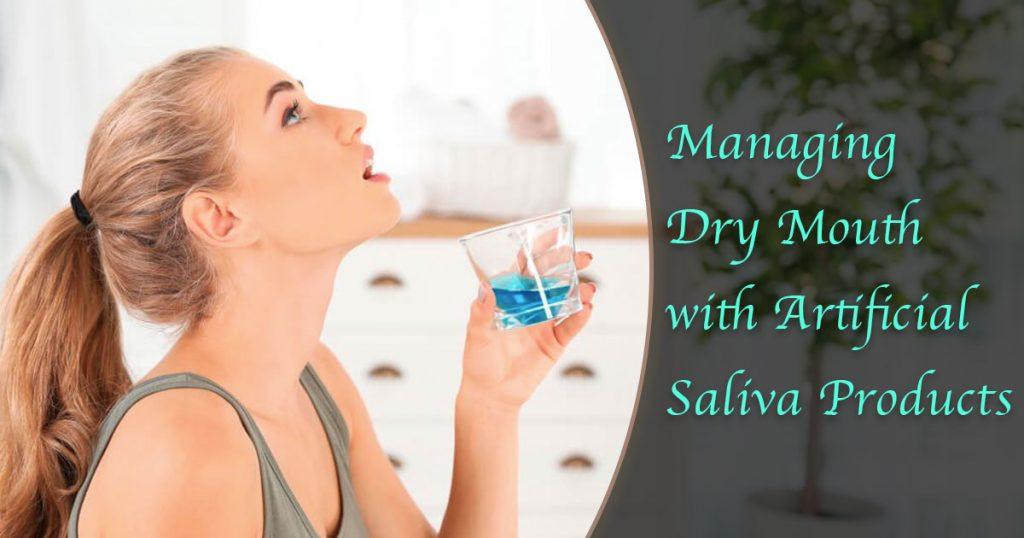Saliva serves a vital function in the processes of chewing, swallowing, digestion, and speech. Additionally, it plays a crucial role in regulating oral bacteria, contributing to the prevention of infections and tooth decay. Individuals experiencing reduced natural saliva production due to specific conditions can benefit from artificial saliva. This alternative not only alleviates the discomfort associated with dry mouth but also aids in preventing potential health complications.
What is artificial saliva?
Also known as synthetic saliva, artificial saliva comes in various formulations, presenting in diverse formats such as:
- Oral spray
- Oral rinse
- Gel
- Swabs
- Dissolving tablets
While natural saliva primarily comprises water, it also contains enzymes, electrolytes, and mucus. Although synthetic saliva may not precisely replicate the composition of the saliva produced naturally by our glands, its unique combination of ingredients is designed to effectively alleviate symptoms associated with dry mouth.
How is artificial saliva used?
Artificial saliva serves as a saliva substitute, offering temporary moisture and lubrication to the mouth while forming a protective film. This not only helps alleviate the discomfort associated with chronic dry mouth but also minimizes the risk of mechanical trauma.
It proves beneficial in relieving symptoms like mouth dryness, stickiness, and bad breath. Physicians may suggest incorporating artificial saliva into your regimen, especially when undergoing treatments or medications—such as pain medications and chemotherapy—that are known to induce dry mouth. Furthermore, it might be recommended as part of the overall treatment plan for specific medical conditions like diabetes, Alzheimer’s, and Sjögren’s syndrome, where dry mouth is a prevalent symptom.
What causes dry mouth syndrome?
Xerostomia, commonly known as dry mouth, manifests when your salivary glands fail to produce an adequate amount of saliva, leading to a lack of moisture in the mouth. Various factors contribute to this condition.
Medications
Dry mouth can be triggered by a multitude of medications, both prescription and over-the-counter. Among the frequently implicated categories are medications utilized for managing conditions such as high blood pressure, depression, anxiety, congestion, and allergies. Additionally, pain medications and muscle relaxants are recognized culprits in inducing dry mouth.
Cancer treatment
The administration of chemotherapy drugs has the potential to diminish the production of saliva. In parallel, radiation treatments aimed at the head and neck region may inflict damage on the salivary glands, resulting in temporary or permanent disruptions in salivary flow. The extent and permanence of these issues hinge on factors such as the specific location targeted and the dosage employed during the treatments.
Tobacco, alcohol, and recreational drug use
Engaging in smoking or chewing tobacco, consuming alcohol, and partaking in recreational drug use, including substances like marijuana and methamphetamines, can contribute to both dry mouth and dental damage.
Aging
The aging process itself can bring about dry mouth, with various factors contributing to this phenomenon. Among these are persistent health issues, suboptimal nutritional intake, the consumption of specific medications, and alterations in how the body metabolizes pharmaceuticals.
Certain medical conditions
Various medical conditions can lead to dry mouth, encompassing:
- Diabetes
- Alzheimer’s
- Stroke
- HIV
- Sjögren’s syndrome
Artificial saliva isn’t a cure but a treatment
While artificial saliva doesn’t present a definitive cure for dry mouth, it serves as a temporary solution, offering relief from associated symptoms such as:
- Sensation of dryness or stickiness in the mouth
- Thick or stringy saliva
- Unpleasant breath
- Dry tongue
- Throat dryness
- Hoarseness
- Cracked lips
- Difficulty in chewing, swallowing, or speaking
- Diminished taste sensation
- Challenges with wearing dentures
Some Popular Saliva Replacement Products
A variety of saliva substitute brands and formulations are accessible, with some available OTC and others requiring a prescription. Here is a concise overview of some widely recognized brands:
- AquaQuench: This lipid-based oral spray, recommended for use three to four times daily, offers approximately 400 sprays per canister. AquaQuench requires a prescription from your healthcare provider.
- HydraSpritz: Offering up to 30 uses per day as needed, HydraSpritz is an oral spray designed to provide up to 2 hours of relief from dry mouth symptoms. It is readily accessible for purchase here.
- XyloFusion: XyloFusion discs adhere to teeth or gums, gradually releasing xylitol to offer prolonged relief from dry mouth symptoms while ensuring fresh breath. Available for purchase here, XyloFusion provides a discreet and efficient solution.
- KoteEase: This nonprescription oral spray, enriched with xylitol, delivers up to 5 hours of relief from dry mouth symptoms. Sugar- and alcohol-free, KoteEase boasts a refreshing citrus flavor. You can find it for purchase here.
- SalivaRevive: Available by prescription, SalivaRevive is a dissolving powder that transforms into a rinse. It is suggested for use 2–10 times daily as directed by your doctor. The product is conveniently packaged in single-use packets.
- Biotène: A sugar-free, alcohol-free, and flavorless gel, Biotène Moisture Fusion provides relief from dry mouth symptoms for up to 4 hours. Available without a prescription, it can be conveniently purchased here.
When should you see a doctor?
If you observe signs and symptoms of dry mouth, it’s imperative to consult with your healthcare provider. During the consultation, your doctor will meticulously assess your medical history and scrutinize the medications you are currently using, as they could be potential contributors to the issue. A thorough examination of your oral cavity will likely be conducted as well.
Try Synthetic Saliva for Temporary Relief
If you’re experiencing symptoms of dry mouth, don’t hesitate to seek medical advice. Early consultation with a healthcare professional can help identify the underlying causes and allow for timely management, potentially averting more severe oral health issues. Remember, addressing dry mouth promptly not only improves your comfort and oral health but can also enhance your overall quality of life.
